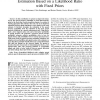Free Online Productivity Tools
i2Speak
i2Symbol
i2OCR
iTex2Img
iWeb2Print
iWeb2Shot
i2Type
iPdf2Split
iPdf2Merge
i2Bopomofo
i2Arabic
i2Style
i2Image
i2PDF
iLatex2Rtf
Sci2ools
TASLP
2008
2008
Improved A Posteriori Speech Presence Probability Estimation Based on a Likelihood Ratio With Fixed Priors
Abstract--In this contribution we present an improved estimator for the speech presence probability at each time-frequency point in the short-time Fourier-transform domain. In contrast to existing approaches this estimator does not rely on an adaptively estimated and thus signal dependent a priori signal-to-noise ratio estimate. It therefore decouples the estimation of the speech presence probability from the estimation of the clean speech spectral coefficients in a speech enhancement task. Using both a fixed a priori signal-to-noise ratio and a fixed prior probability of speech presence, the proposed a posteriori speech presence probability estimator achieves probabilities close to zero for speech absence and probabilities close to one for speech presence. While state-of-the-art speech presence probability estimators use adaptive prior probabilities and signal-to-noise ratio estimates we argue that these quantities should reflect true a priori information that shall not depend on the ...
| Added | 15 Dec 2010 |
| Updated | 15 Dec 2010 |
| Type | Journal |
| Year | 2008 |
| Where | TASLP |
| Authors | Timo Gerkmann, Colin Breithaupt, Rainer Martin |
Comments (0)

